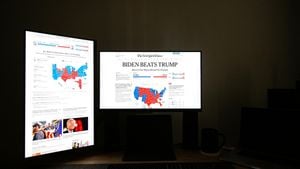Russia's strategic recalibration is more than just a bureaucratic maneuver; it's shaping the broader geopolitical scene, especially as tensions escalate around Ukraine. President Vladimir Putin's recent alterations to Russia's nuclear doctrine are underscoring the precarious state of international relations following increased military support for Ukraine from the U.S. administration.
Just days prior to the announcement, President Joe Biden reportedly lifted restrictions on the use of U.S.-supplied ATACMS long-range missiles by Ukraine. This decision has sparked intense discussions on whether it constitutes an escalation of the conflict. According to reports, Ukraine successfully fired these U.S. missiles targeting locations deep within Russian territory, marking what would be the first such offensive since the initial stages of the conflict began.
Putin’s revised nuclear posture asserts its readiness to respond with nuclear force if Russia or its allies face aggression from non-nuclear states, especially if supported or joined by nuclear powers. This indicates Moscow’s intent to deter any perceived existential threats, illustrating how serious the Kremlin is about safeguarding its sovereignty and territorial integrity.
For years, the nucleus of Russia's nuclear policy revolved around firm thresholds for nuclear engagement. The previous doctrine from 2020 allowed for nuclear retaliation only under dire circumstances, such as direct nuclear attacks or potentially fatal conventional strikes. Now, under the updated doctrine, even conventional assaults supported by nuclear-capable states are deemed threats serious enough to warrant potential nuclear response.
"The aggression against the Russian Federation and its allies by any non-nuclear state with the explicit aim of military support from nuclear nations will be interpreted as combined provocations warranting response," the revised doctrine states.
Analysts view this evolution as a clear message to Western powers, particularly as signs of military preparedness increase on both sides. With this shift, experts believe Russia aims to preemptively signal its willingness to use nuclear deterrents should the conflict escalate beyond conventional warfare. The Kremlin's vocal assertions about its nuclear capabilities are reminiscent of Cold War rhetoric, raising alarms within NATO circles as 200,000 Russian troops remain stationed near Ukraine.
The backdrop of this policy change is overshadowed by the war's progression. The conflict, which started on February 24, 2022, has led to devastating impacts, claiming thousands of lives and causing widespread humanitarian crises, as it has entered its 1,000th day. The stakes are high as recent approvals from the U.S. could serve as an inciting factor for more aggressive Russian military strategies.
Compounding these tensions, reports have surfaced about North Korean troops being deployed to Russia, which has intensified Western concerns. U.S. Analysts suggest more than 10,000 North Korean troops are currently involved, particularly around regions where Ukraine has maintained operational footholds, signaling potential new dynamics to the battlefield.
"The involvement of North Korean forces adds another layer to already volatile conditions and symbolizes the collaboration between Moscow and Pyongyang, which could reshape the conflict’s dynamics entirely," said national security experts following the recent army movements.
Within this tangled web of international politics, the fate of Ukraine hangs heavily. While Biden’s decision on missile use has sparked debate about the right approach, the administration's focus remains on countering Russian adventurism rather than provoking unnecessary escalation. Pentagon spokespeople reinforced this sentiment, asserting the importance of monitoring for any shift in Russia's military posturing.
Despite the risks, several U.S. lawmakers support Biden's strengthened support for Ukraine, claiming it is necessary to counteract the ever-elusive Russian threat. Critics, on the other hand, caution against the dangerous precedent set by openly supplying Ukraine with long-range missile capabilities, fearing it might spur Russia to retaliate aggressively.
This nuclear doctrine shift also reverberates beyond military limits, affecting foreign relations and global economic stability. Following this announcement, gold prices surged as investors flocked to safe-haven assets due to heightened concern over potential nuclear confrontations. Gold's recent climb to around $2,635 reflects not only market response but also psychological undertones signaling fear stemming from geopolitical tensions.
Spokesperson Dmitry Peskov articulated Moscow’s rationale, stating, "The revision of our nuclear stance reflects the realities we are facing today, and it is prudent to prepare for any scenarios of hostile engagements." The Kremlin’s priority is evidently to secure its military strategies within the bounds of defense, asserting their right to protect the nation's sovereignty against any looming threats.
With the specter of nuclear escalation impacting both political and military strategies, global leaders find themselves at the crossroads of diplomacy and military readiness. The stakes are higher than ever, as every decision made has the potential to spiral beyond their original intentions. Amidst this turmoil, as Vladimir Putin recalibrates Russia's deterrent mechanisms and framework, the international community watches closely, praying for stability rather than descent.



